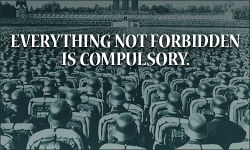Difference between revisions of "Totalitarianism"
Jump to navigation
Jump to search
(Added: wikiquote.) |
|||
| Line 3: | Line 3: | ||
|image=Totalitarianism.jpg | |image=Totalitarianism.jpg | ||
|wikipedia=https://en.wikipedia.org/wiki/Totalitarianism | |wikipedia=https://en.wikipedia.org/wiki/Totalitarianism | ||
| + | |wikiquote=http://en.wikiquote.org/wiki/Totalitarianism | ||
}} | }} | ||
==Official narrative== | ==Official narrative== | ||
Revision as of 18:50, 3 August 2017
(ideology) | |
|---|---|
 | |
| Interest of | • Hannah Arendt • Big Brother Watch • Mattias Desmet |
Official narrative
Since we live in a democracy, it could never happen here...
Examples
| Page name | Description |
|---|---|
| Global control grid | To the ambitious megalomaniac, 21st century technology is not only very enticing but also becoming more so. To the deep politicians of the Deep State, money is no object, so a whole range of grand schemes for technological control are conceivable. |
| Inverted totalitarianism | |
| Police state | Wikipedia terms a police state as a "fundamentally authoritarian" form of government, and cites examples of the Soviet Union and its satellites plus North Korea. No mention in the article of the 21st century global shift towards authoritarian policies lead by the USA, such as the removal of civil liberties and the use of universal surveillance or false flag terror. |
Related Quotations
| Page | Quote | Author | Date |
|---|---|---|---|
| Hannah Arendt | “Evil comes from a failure to think. It defies thought for as soon as thought tries to engage itself with evil and examine the premises and principles from which it originates, it is frustrated because it finds nothing there. That is the banality of evil.” | Hannah Arendt | |
| Ferdinand Grapperhaus | “Activists and extremists only provocate. I understand their emotion, but we need to make these individuals go away. Either behind bars, or else expel them from the country, or else fine them so many times that they'll only be able to be a paperboy.” | Ferdinand Grapperhaus | |
| Plastic word | “In certain kinds of writing, particularly in art criticism and literary criticism, it is normal to come across long passages which are almost completely lacking in meaning. Words like romantic, plastic, values, human, dead, sentimental, natural, vitality, as used in art criticism, are strictly meaningless, in the sense that they not only do not point to any discoverable object, but are hardly ever expected to do so by the reader. When one critic writes, ‘The outstanding feature of Mr. X's work is its living quality’, while another writes, ‘The immediately striking thing about Mr. X's work is its peculiar deadness’, the reader accepts this as a simple difference opinion. If words like black and white were involved, instead of the jargon words dead and living, he would see at once that language was being used in an improper way. Many political words are similarly abused. The word Fascism has now no meaning except in so far as it signifies ‘something not desirable’. The words democracy, socialism, freedom, patriotic, realistic, justice have each of them several different meanings which cannot be reconciled with one another. In the case of a word like democracy, not only is there no agreed definition, but the attempt to make one is resisted from all sides. It is almost universally felt that when we call a country democratic we are praising it: consequently the defenders of every kind of regime claim that it is a democracy, and fear that they might have to stop using that word if it were tied down to any one meaning. Words of this kind are often used in a consciously dishonest way. That is, the person who uses them has his own private definition, but allows his hearer to think he means something quite different. Statements like Marshal Petain was a true patriot, The Soviet press is the freest in the world, The Catholic Church is opposed to persecution, are almost always made with intent to deceive. Other words used in variable meanings, in most cases more or less dishonestly, are: class, totalitarian, science, progressive, reactionary, bourgeois, equality.” | George Orwell | 1946 |
Related Documents
| Title | Type | Publication date | Author(s) | Description |
|---|---|---|---|---|
| Document:The Essential Rules of Tyranny | webpage | 29 July 2011 | Brandon Smith | |
| File:1984.pdf | book | 1949 | George Orwell | George Orwell's classic and prescient 1949 dystopian novel about total surveillance in "Oceania", one of the world's then three warring power blocks. |
Many thanks to our Patrons who cover ~2/3 of our hosting bill. Please join them if you can.